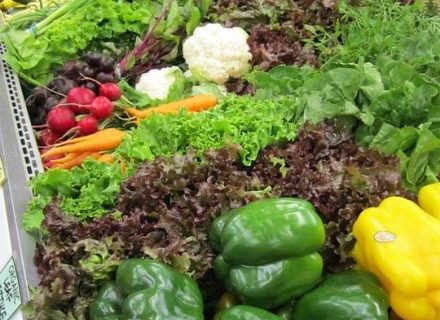Organic vs. Non-Organic Food ~ What's the Difference?
Before I became really educated on the differences between organic and non-organic, I used to wonder if it was really necessary to purchase organic food. When I began researching the topic, I found that there's so much information available, that although it's easy to learn more about it, it's also over-whelming. This post shares what I learned from the initial questions I had on the big debate between which is better. These answers helped me make a more informed decision, I hope they're just as helpful for you.
What Does Organic Mean?
Every country has its own set of organic standards and some countries ( Canada and the United States for example) recognize each other’s standards for organic certification. Farmers that produce organic food must meet strict guidelines and regulations in order to label their food organic. This includes producing food without the use of synthetic pesticides such as insecticides, fungicides, rodenticides, and arsenate, to name only a few. Although lots of products contain some organic ingredients, in order for a product to carry the ‘organic’ label (in Canada & the U.S.), it must contain at least 95% organic ingredients. It's on these products that you will find the following labels:

Most produce doesn't contain an organic label; however you can look at the PLU sticker. The PLU sticker is the one found on fruits and vegetables that contains numbers. These are the numbers used to ring through produce at the checkout. Organic produce begins with a 9 and contains 5 numbers. When you can’t find an organic sticker on produce, look at the PLU sticker.
Why Purchase Organic Before Non-Organic?
1) Money talks! The products you buy with your hard-earned money help to dictate what products a store will carry. When the demand for organic products goes up, so does the supply. Every dollar used to purchase organic products helps to make a difference. Not only does it help to inform a store on what to sell, it helps to support a more sustainable industry; an industry that puts value on the health and well-being of everyone and everything, including our planet.
2) The chemicals used to produce non-organic foods are foreign substances to your body. Pesticides and other chemicals are widely used in our environment; therefore you don’t always have a choice to not be around them, however you always have a choice in what foods you consume.
Do I Have to Buy Everything Organic?
These days I buy as much organic food as I can. However in the beginning I started slowly and here's what I considered when deciding what to buy organic:
Most consumed produce ~ Choose organic with the produce that you consume the most. These are the items that are in your shopping cart every week without fail. This helps to ensure you're consuming less chemicals and it helps to support the farmers who grow these foods, which helps them to be able to produce more of these foods organically.
Think sweet ~ Insects tend to be drawn to sweet things; therefore the sweeter the food, the more pesticides that are required to keep them away. Some of these foods to consider buying organic are apples; strawberries; raspberries; peaches; carrots; and sweet bell peppers, to list a few.
Organic meat ~ Organic meat comes from animals that are fed organic food, meaning food that is grown without the use of toxic or synthetic pesticides, herbicides, fungicides, and fertilizers. The animals must be treated humanely with no use of growth hormones or GMO’s and once butchered and processed, must be done so following organic regulations.
What’s the Difference Between Organic and Non-GMO?
GMO stands for Genetically Modified Organism. Just as the name says, it means that a product has been genetically altered by science to create combinations of plant, animal, bacterial, and viral genes that don’t naturally occur. One of the most common GMO foods is corn. Corn is in a multitude of products that we consume and may appear on a food label under a multitude of names. Here are a just few to give you an example: cellulose; corn syrup; dextrin; hydrolyzed vegetable oil; maize; maltodextrin; maltose; and sorbitol. All food carrying the organic label in Canada and the U.S. must also be Non-GMO. However, if a label says, 'Non-GMO' it doesn’t also mean that it’s 'organic'. Look for the ‘certified organic’ label to be sure you're buying organic, Non-GMO products. A useful website for learning more about Non-GMO food is, www.nongmoproject.org
Are 'Natural' and 'Organic' the Same Thing?
Absolutely not! Many products can contain natural ingredients and manufacturers love to put the word natural on their food (or other) labels. Seeing natural on a label makes you think you're buying something healthy, even if you aren’t. Without the organic label on the package, foods may contain natural ingredients, but not necessarily organic ingredients. Keep in mind that you can still buy organic ‘junk food.’ Chips, pizza, ice cream, cookies, etc. still fall under the ‘junk food’ category even if you purchase the organic version of them.
Does Organic Taste Better?
I believe it most definitely does, however your taste buds may tell you differently. One of the foods that I notice a huge taste difference in, is strawberries. Non-organic strawberries are bigger in size, not on taste. Organic strawberries are smaller, and their shelf life isn’t as long, however that doesn’t matter since they're so incredibly juicy and sweet, they never last long in our house anyway.
I don't eat meat so I can’t speak for the taste difference there, however my husband tells me that he does notice a difference and says that organic meat definitely tastes better.
At the end of the day, I don’t know for sure what the long term-effects of pesticides are on my health, the health of my family, or on the health of the planet. What I do know is that pesticides are created and used to kill pests and all those that are considered pests, are living organisms just like I am.
As much as it is within my power to do so, I choose to reduce the amount of toxins my body consumes. I know that this is the only body I will ever have and that it’s always working hard for me. The more toxins I allow to invade it, the harder it has to work at releasing them. I know that I haven’t always been good to my body, however every day I'm provided an opportunity to do better than I did yesterday. I choose to be consciously aware of the foods that I consume knowing that it helps me to thrive.
I know that there is only one planet Earth and I care about its future; my choices today contribute to its health tomorrow. I also know that the greatest gifts I can give my children are a healthy mommy and healthy lifestyle habits. I believe that organic is a healthier lifestyle habit.
*Note: This blog is specifically about organic vs. non-organic food, however much of this information applies to other areas not related to food as well. When I began learning more about organic, my focus was on food. Over time my focus shifted to other areas of my life such as cleaning products, skincare products, clothing, and so on. As much as I can, I choose to buy organic with everything I buy.
Do you eat organic? Let me know in the comments.
Click here to learn more about Reducing Toxins to Improve Your Health
Click here for a variety of delicious and healthy recipes
If you love this blog, I'd greatly appreciate you sharing it so that others can benefit from reading it as well. Thank you.
Looking for more tips to help you live well? Check out Your Live Well Journey - The Podcast, every episode offers ways to help you improve your self-care.


